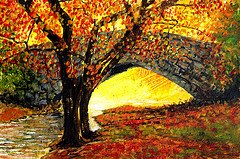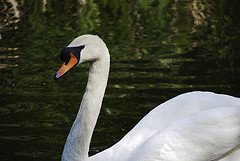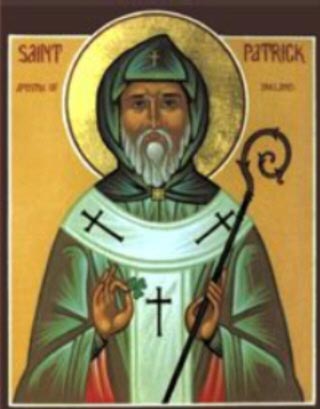Great Irish Love Poems
Looking for Irish love poems to charm the Celtic heart of your loved one? Or just trying to learn how the Irish approach affairs of the heart? Well I have put together two pages for you to delight in. This page has many Gaelic love poems translated to English and some more modern love poems. I have also put together a collection of Irish Wedding Poems, suitable for the special occasion. So read on.
As I mentioned many of the beautiful Irish love poems below were written in Gaelic, some dating as early as the 9th century but despite their age, many are just as relevant today.
At the library in Dublin, I stumbled across a wonderful collection edited by Sean Lucy called Love poems of the Irish. Although this 1967 book is now out of print, it contains many an Irish love poem translated with craft by some of the foremost Irish scholars such as the first president of Ireland, Douglas Hyde (one of the founders of the Gaelic league) and the writer, Frank O Connor.
It's hard to know when exactly any of the earlier love poems below were written, so you'll have to excuse dating which is rough, and often refers to a possible span of three of four centuries for when they were composed.
Irish Love Poems translated from Gaelic
Advice to Lovers
Anonymous (7th-12th Centuries)
Translated by Frank O Connor
The way to get on with a girl
Is to drift like a man in the mist,
Happy enough to be caught,
Happy enough to be dismissed.
Glad to be out of her way,
Glad to rejoin her in bed,
Equally grieved or gay
To learn that she’s living or dead.
Jealousy
Anonymous (13th-17th Century)
Translated by Frank O Connor
Love like heat and cold
Pierces and then is gone;
Jealousy when it strikes
Sticks to the marrowbone.
The Ex-Poet
Anonymous (7th-12th Centuries)
Once the ex-poet Cuirithir
And I were lovers; there’s no cure;
And I am left to the bear the pain.
Knowing we shall not meet again.
South of the church there stands a stone
Where the ex-poet sat alone;
I sit there too at close of day
In twilight when I come to pray.
No woman now shall be his mate,
No son nor daughter share his fate,
No thigh beside his thigh repose-
Solitary the ex-poet goes.
Fand Yields Cúchulainn to Emer
This Irish love poem involves the hero of so many Irish legends, Cúchulainn, who fell for a woman of the otherworld Fand. Emer , his wife, was prepared to fight to keep her man and Fand let go of 'her man' and returned to the otherworld.
Anonymous (9th-12th Century)
Emer, he is your man, now,
And well may you wear him,
When I can no longer hold him,
I must yield him.
Many a man has wanted me,
But I have kept my vows.
I have been an honest woman,
Under the roofs and boughs.
Pity the woman loves a man,
When no love invites her.
Better for her to fly from love
if unloved, love bites her.
I am stretched on your grave
Anonymous (18th Century)
Translated byFrank O Connor
(This is still a popular poem and many sung versions exist.)
I am stretched on your grave
And would lie there forever;
If your hands were in mine
I’d be sure we’d not sever.
My apple tree, my brightness,
‘Tis time we were together
For I smell of the earth
And am stained by the weather.
When my family think
That I’m safe in my bed
From night until morning
I am stretched at your head,
Calling out to the air
With tears hot and wild
My grief for the girl
That I loved as a child.
Do you remember
The night we were lost
In the shade of the blackthorn
And the chill of the frost?
Thanks be to Jesus
We did what was right,
And your maidenhead still
Is your pillar of light.
The priests and the friars
Approach me in dread
Because I still love you
My love and you dead,
And would still be your shelter
From rain and from storm
And with you in the cold grave
I cannot sleep warm.
Irish Love Poem
I am stretched on your grave
Sung by Kate Rusby
Exile
Anonymous (7th-12th Centuries)
Translated by Frank O’ Connor
What happier fortune can one find
Than with the girl who pleased one’s mind
To leave one’s home and friends behind
And sail on the first favouring wind?
Forgetfulness
Anonymous (13th-17th Centuries)
Translated by The Earl of Longford
If now you hate me as you say,
Can you forget so soon
How you and I, the world away,
Once lay and watched the moon?
Can you forget the day when cool
Seemed to our love the sun,
The day that we-? But I’m a fool,
Besides, that day is done.
Can you forget you stroked my hair?
Moist palm upon my brow,
Red mouth, soft breast-. You do not care.
All that’s forgotten now.
Have you forgotten too, my flower,
How often you would tell
How God ne’er made until that hour
A man you loved so well?
Can you forget your love for me,
Whom now you do detest?
But that’s all one, those times are gone.
No doubt ‘tis for the best.
If each could learn as well as I
To profit by my pain,
There’s ne’er a man beneath the sky
Would ever love again.
I shall not die
Anonymous (13th-17th Centuries)
Translated by Douglas Hyde
For thee I shall not die,
Woman high of fame and name,
Foolish men thou mayest slay,
I and they are not the same.
Why should I expire
For the fire of any eye,
Slender waist or swan, like limb,
Is’t for them that I should die?
The round breasts, the fresh skin,
Cheeks crimson, hair like silk to touch,
Indeed, indeed, I shall not die,
Please God, not I, for any such!
The golden locks, the forehead thin,
The quiet mien, the gracious ease,
The rounded heel, the languid tone,
Fools alone find death from these.
Thy sharp with, thy perfect calm,
Thy thin palm like foam of the sea;
Thy white neck, thy blue eye,
I shall not die for thee.
Woman, graceful as the swan,
A wise man did rear me, too,
Little palm, white neck, bright eye
I shall not die for you.
The Maiden's Plight
Brian Merriman (1747-1805)
translated by Frank O’Connor
I'm not so sure you could describe this as an Irish love poem. It really just deals with the age old frustrations but great nonetheless and I just love O' Connor's translation
I fasted three canonical hours
To try and come round the heavenly powers;
I washed my shift where the stream was deep
To hear a lover’s voice in sleep;
Often I swept the woodstack bare,
Burned bits of my frock, my nails, my hair,
Up the chimney stuck the flail,
Slept with a spade without avail;
Hid my wool in a limekiln late
And my distaff behind the churchyard gate;
I had flax on the road to halt coach or carriage
And haycocks stuffed with heads of cabbage,
And night and day on the proper occasions
Invoked Old Nick and all his legions,
But ‘twas no good and I’m brokenhearted,
For here I’m back at the place I started;
And this is the cause of all my tears.
I am fast in the rope of the rushing years,
With age and need in lessening span,
And death beyond, and no hope of a man.
Dónal Óg
8th Century poem
Translated by Lady Gregory (1855-1932)
It is late last night the dog was speaking of you;
the snipe was speaking of you in her deep marsh.
It is you are the lonely bird through the woods;
and that you may be without a mate until you find me.
You promised me, and you said a lie to me,
that you would be before me where the sheep are flocked;
I gave a whistle and three hundred cries to you,
and I found nothing there but a bleating lamb.
You promised me a thing that was hard for you,
a ship of gold under a silver mast;
twelve towns with a market in all of them,
and a fine white court by the side of the sea.
You promised me a thing that is not possible,
that you would give me gloves of the skin of a fish;
that you would give me shoes of the skin of a bird;
and a suit of the dearest silk in Ireland.
When I go by myself to the Well of Loneliness,
I sit down and I go through my trouble;
when I see the world and do not see my boy,
he that has an amber shade in his hair.
It was on that Sunday I gave my love to you;
the Sunday that is last before Easter Sunday
and myself on my knees reading the Passion;
and my two eyes giving love to you for ever.
My mother has said to me not to be talking with you today,
or tomorrow, or on the Sunday;
it was a bad time she took for telling me that;
it was shutting the door after the house was robbed.
My heart is as black as the blackness of the sloe,
or as the black coal that is on the smith's forge;
or as the sole of a shoe left in white halls;
it was you put that darkness over my life.
You have taken the east from me, you have taken the west from me;
you have taken what is before me and what is behind me;
you have taken the moon, you have taken the sun from me;
and my fear is great that you have taken God from me!
I will walk with my love
Traditional Irish Love poem
I once loved a boy, just a bold Irish boy
who would come and would go at my request;
and this bold Irish boy was my pride and my joy
and I built him a bow'r in my breast.
But this girl who has taken my bonny, bonny boy,
let her make of him all that she can;
and whether he loves me or loves me not,
I will walk with my love now and then.
"I will walk with my love"
-sung by Maureen Hegarty
Modern Irish Love poems
Moonshine
Richard Murphy (1927-)
The dilemma of love!
To think
I must be alone:
To love
We must be together.
I think I love you
When I’m alone
More than I think of you
When we’re together.
I cannot think
Without loving
Or love
Without thinking.
Alone I love
To think of us together:
Together I think
I’d love to be alone.
The Lovers
W R Rodgers (1910-1969)
After the tiff there was stiff silence, till
One word, flung in centre like single stone,
Starred and cracked the ice of her resentment
To its edge. From that stung core opened and
Poured up one outward and widening wave
Of eager and extravagant anger.
Holy Thursday
Paul Muldoon (1951-)
They're kindly here, to let us linger so late,
Long after the shutters are up.
A waiter glides from the kitchen with a plate
Of stew, or some thick soup,
And settles himself at the next table but one.
We know, you and I, that it's over,
That something or other has come between
Us, whatever we are, or were.
The waiter swabs his plate with bread
And drains what's left of his wine,
Then rearranges, one by one,
The knife, the fork, the spoon, the napkin,
The table itself, the chair he's simply borrowed,
And smiles, and bows to his own absence.
More Irish Love poems and related pages
For more Irish love poetry, make sure to visit our Irish Wedding Poems and Songs page.
If interested in the general love theme take a look at our Irish Wedding Toast and Irish Wedding Blessings pages where you will finds lots on the matrimonial theme.
There are lots of words of wisdom on the topic of love on our Irish love sayings page and you will find some different and humorous Irish love sayings on our Funny Irish Sayings page.
Find out about Irish wedding customs and traditions and visit our wedding superstitions page for some far-fetched beliefs.
Gaelic Matters > Irish Love Poems
Did you know that Saint Patrick was not an Irish man or the first to bring Christianity to Ireland? Learn a little of the History of St Patrick.




New! Comments
Have your say on Gaelic Matters! Leave me a comment in the box below.